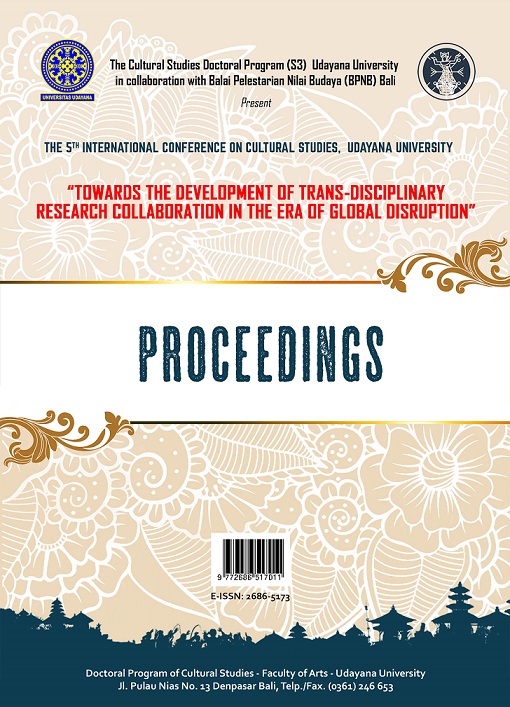RE-READ THE PROSTITUTION PREVENTION POLICY IN BALI: BIO-POLITICS IN POWER RELATIONS OF THE REGIONAL BUREAUCRATES AND SEX WORKERS IN THE DENPASAR CITY
Abstract
The prostitution prevention policy in eastern culture country such as Indonesia tends to be approached by eliminating the commercial sex workers (CSWs) due to the social moral and health reasons or by alleviating them by providing business capital for their welfare. This policy is always re-reviewed by both the central and the regional government. They ignore whether the acts of prostitution they repress are able to create a space so that as if the state allows them. The state through the regional bureaucratic apparatus always holds routine actions of closing the prostitution business and bringing CSWs into order with a purpose to improve the moral image of the regional leaders along with the bureaucratic apparatus. This article tries to re-read the regulations related to the prevention of prostitution in Bali, especially the Denpasar city. This does not review the successful narrative of the implementation of The Regional Regulation No. 1 of 2015 concerning Public Order which is always reported by the bureaucracy, but it re-reads the regulation by examining various stories of potential failures of this product of regulation, the contention of discourse as well as the state’s hidden agenda which actually becomes a productive power unrealized by either the regulatory enforcer bureaucrats or the object of the regulation namely the CSWs. This article has a non-positivist paradigm with an interpretive perspective. The theory used in this article is governmentality especially bio-power and the Michel Foucault’s panopticon concept borrowed from Bentham’s. This is a qualitative research with a case study in Denpasar. Denpasar is a city considered an actualization of urban space believed to always have a tug of war of the production of sexuality discourse. The data was collected by observation, interviews that prioritized emics rather than ethics, and documentation. The data were analyzed by using critical discourse analysis that examined the micro findings in the field and then analyzed the structure of the macro politics therein.
Downloads
References
Banurea, Rima Nusantriani. Berlindung dalam Hak Asasi Manusia : Strategi Pekerja Seks di Eropa untuk Mentransformasi Kebijakan Prostitusi, Jurnal Ilmu Sosial dan Ilmu Politik, Volume 16, Nomor 3, Maret 2013. Halaman 274.
Caswanto, NPM. 2016. Tindak Pidana Prostitusi yang Diusahakan dan Disediakan oleh Hotel di Indramayu dalam Perspektif Hukum Pidana di Indonesia. repository.unpas.ac.id/4975/3/BAB%20I.pdf
Duarte, Magdalena. 2012. Prostitution and Trafficking in Portugal: Legislation, Policy, and Claims. Sex Res Soc Policy (2012) 9:258–268 DOI 10.1007/s13178-012-0093-2
Harringtonn, Carol. 2011. Governing Sex Workers in Timor Leste. Asia Pacific Viewpoint, 04/2011, Volume 52, Issue 1
Hubbard, Phil, Matthews, Roger, dan Scoular, Jane. 2008. Regulating sex work in the EU: prostitute women and the new spaces of exclusion, dalam Gender, Place and Culture Vol. 15, No. 2, April 2008, 137–152, Routledge.
Hernes, Helga Maria. 1987b. The Welfare State and Women Woman Power: Essays in State Feminism. Oslo : Norwegian University Press. Lebih lanjut lihat Mattson, ibid. Halaman. 160-165
Joni, Dewa Ayu Sugiarica. 2018. Pemanfaatan Media Online Pekerja Seks Pria di Bali. Laporan Penelitian.
Kilvington. Judith. Daya, Sophie. 2001. Prostitution Policy in Europe: A Time of Change? Feminist Review No. 67 Spring 21.
LPPM Universitas Udayana. Rencana induk Penelitian Universitas Udayana Tahun 2017-2021. Tersedia dalam https://lppm.unud.ac.id/wp-content/uploads/buku-rencana-induk-penelitian unud-2017-2021.pdf
Mattson, Greggor, Christian. 2008. Governing Loose Women: Rationalizing European Prostitution, 1998–2004. University of California, Berkeley, Proquest Dissertations Publishing, 2008. 3331707
Mattson, Greggor. The Cultural Politics of European Prostitution Reform: Governing Loose Women. Palgrave Macmillan: UK.
Mariyadi. 2013. Persepsi Masyarakat tentang Prostitusi Liar di Keluarahan Sempaja Utara Samarinda. Journal Volume II. No. 4. Tahun 2013.
Moleong. Lexi.J. 2007. Metodologi Penelitian Kualitatif, Edisi Revisi. Bandung: Remaja Rosdakarya
O’Neill, Maggie & Pitcher, Jane. 2001. Prostitution: Sex Work, Policy & Politics. Sage: London.
Sanders, Teela. 2001. Blinded by morality? Prostitution policy in the UK. Capital & Class, Issue 86; serta Sanders, Teela & Brown, Kate. 2017. Pragmatic, Progressive, Problematic: Addressing Vulnerability through a Local Street Sex Work Partnership Initiative. Social Policy & Society (2017)16:3, 429–441 C.
Sauer, Birgit. 2004. Taxes, rights and regimentation: discourses on prostitution in Austria. Dalam The Politics of Prostitution : Women’s Movements, Democratic States and The Globalisation of Sex Commerce. Dalam Outshoorn. Op.cit. Halaman 41
Saputra, RP. Dampak Praktek Prostitusi terhadap Pengembangan Pariwisata di Sekitar Parangtritis. eprints.uny.ac.id/53389/5/Ringkasan%2013413241037.pdf
Umiarso, Elbadiansah. 2016. Interaksionisme Simbolik: Dari Era Klasik hingga Modern. Rajagrafindo Press : Jakarta
Weitzer. Ronald. 2009. Morality Politics in Western Australia. The British Journal of Criminology,Vol. 49, No. 1, Moral Panics—36 Years On Januari 2009, pp. 88-105.
Mass Media :
Bali Ekspress, 5 Januari 2018
cnnIndonesia, 25 Mei 2018
Sindonews, 26 Agustus 2018
Interview with Informant





